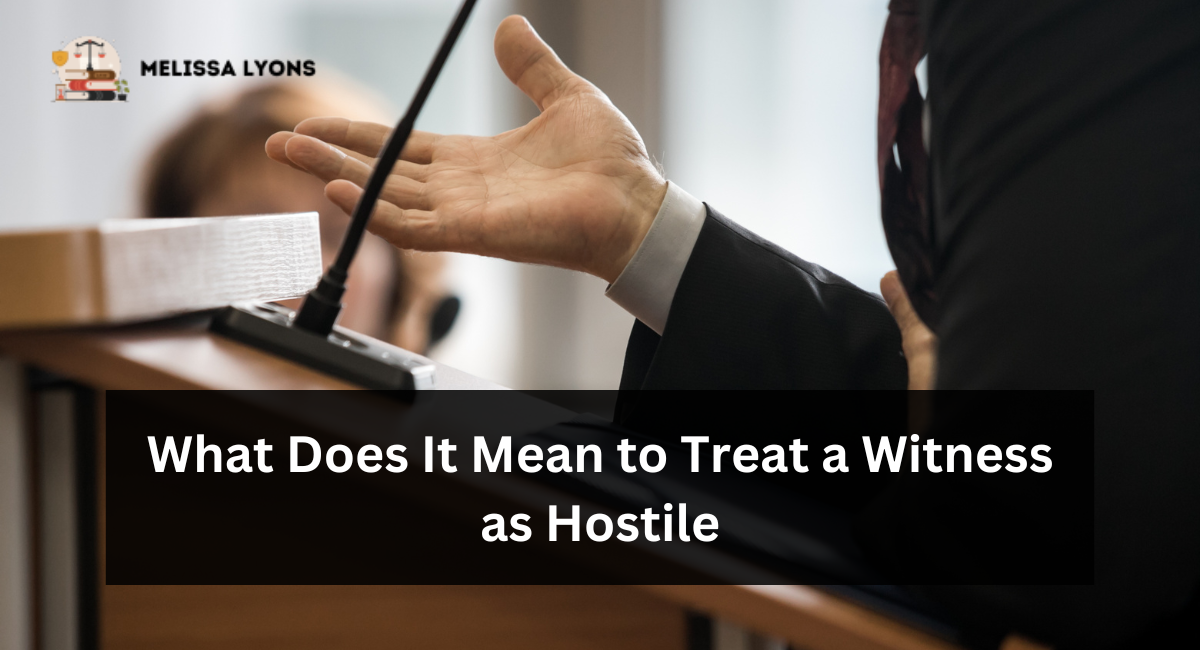Witnesses may be classified as hostile when their oath testimony differs significantly from what was presented in their pre-trial statement, enabling the lawyer or barrister who called them to use leading questions against them during cross-examination.
These questions would usually be prohibited during direct examination; this technique puts hostile witnesses at their most exposed.
What is a hostile witness?
Hostile witnesses are defined as any witnesses who refuse to tell the truth when called witnesses or those who demonstrate bias against the cause for which they were called by either party involved. A hostile witness can be declared as such during pre-trial statements or cross-examination.
Attorneys typically only ask open-ended questions of their witnesses during direct examination and leading questions when questioning witnesses called by other parties. However, if a witness shows signs of hostility during the immediate test, a lawyer may request permission to treat them as hostile witnesses.
If the judge grants that request, witnesses can be asked leading questions during direct examination (questions that require yes-or-no answers) to limit their testimony and prevent them from going off in unproductive directions that could harm their client’s cause. They may also be cross-examined by attorneys representing both sides – something only allowed if a witness has been declared hostile.
How can a lawyer treat a hostile witness?
Witnesses who appear reticent to support the party that called them can be declared hostile and asked by the court for special permission to question them differently, with leading questions usually reserved for cross-examination being allowed by them.
A lawyer may request permission from a judge to lead hostile witnesses by asking questions that suggest answers; typically, witnesses can only answer open-ended questions.
Use caution when employing this tool to maximize its impact and avoid missing an opportunity to highlight bias or unreasonableness in witness testimony. Waiting until after they have presented critical testimony may ensure you push them as far as possible without jeopardizing their ability to defend themselves during cross-examination.
What happens if a witness is declared hostile?
When witnesses are hostile or antagonistic towards one party calling them, they may seek to have the judge declare them aggressive during direct examination. When this occurs, attorneys examining them are given more freedom in asking leading questions that suggest an answer; commonly, leading questions would not be permitted, but these types of questions can be used more freely during cross examination.
Witnesses can become hostile for personal reasons – for instance, if they refuse to testify about something that might jeopardize a friendship. When such witnesses contradict their pre-trial statement and become dishonest during trial proceedings, those calling them may apply to have them declared hostile witnesses.
Lawyers must find ways to explore the source of hostility without immediately attacking it; doing so early in proceedings may increase hatred further and hinder their ability to collect valuable witness testimony.
What happens if a witness is not declared hostile?
An adverse witness is a legal term used by attorneys to describe witnesses who resist cross-examination by asking leading questions during direct examination. This is unlike cross-examining hostile witnesses, where leading questions are allowed. During direct examination, attorneys cannot request leading questions because direct reflection requires answering one-word answers such as yes/no questions from their client; however, during cross-examination of a hostile witness, this restriction does not exist; attorneys are free to use leading queries when cross-examining hostile witnesses.
Consider Your Witness’s Speaking Rhythm
A witness’s speaking rhythm can have an enormous effect on their testimony. For instance, if they speak rapidly with short staccato declarative sentences that tend towards short and staccato pronouncement patterns, an attorney may want to pose more assertive and challenging questions with shorter sentence structures and ask leading questions in that vein.
An attorney can use discrepancies between what was stated pre-trial and what they say on the stand to try and discredit hostile witnesses. To do this, an application must be made directly to the judge without regard to jury presence, requesting permission to question said witness as hostile based on their demeanor and credibility; only then will such questioning occur.
Conclusion:
In conclusion, treating a witness as hostile is a legal maneuver that occurs during court proceedings when the opposing counsel believes that the witness is uncooperative or openly antagonistic. This strategy aims to challenge the witness’s credibility and elicit more favorable information for the cross-examining party. While it may seem confrontational, this approach is a crucial tool in the legal toolkit, allowing attorneys to navigate the complexities of a case and ensure a fair presentation of evidence.
Understanding the dynamics of treating a witness as hostile sheds light on the intricacies of courtroom tactics. Attorneys must master this technique to effectively navigate the legal terrain and present their case with clarity and precision. As legal proceedings unfold, the ability to handle witnesses—whether cooperative or hostile—plays a pivotal role in shaping the outcome of a case.
